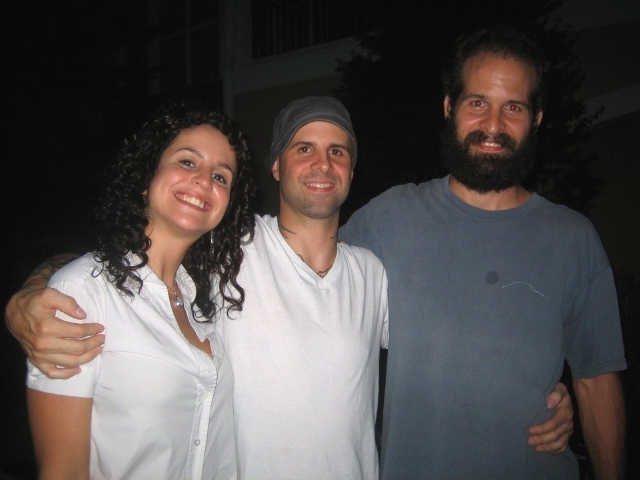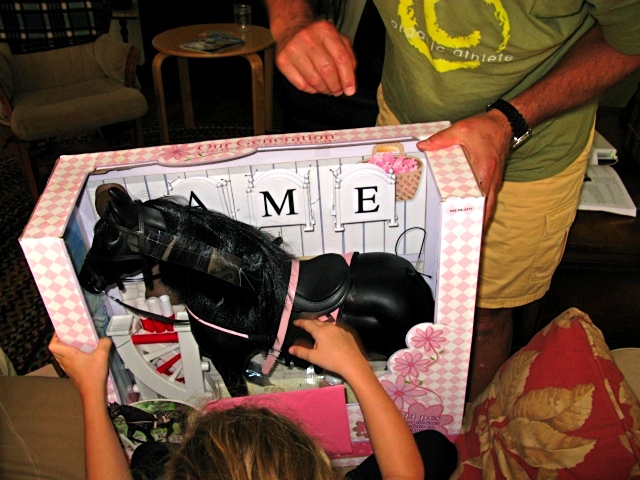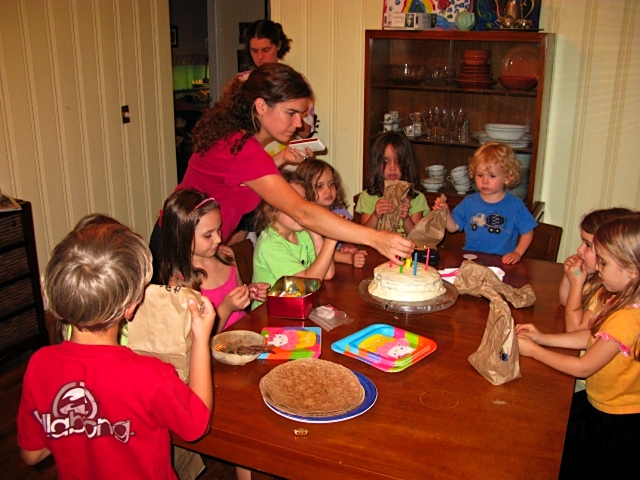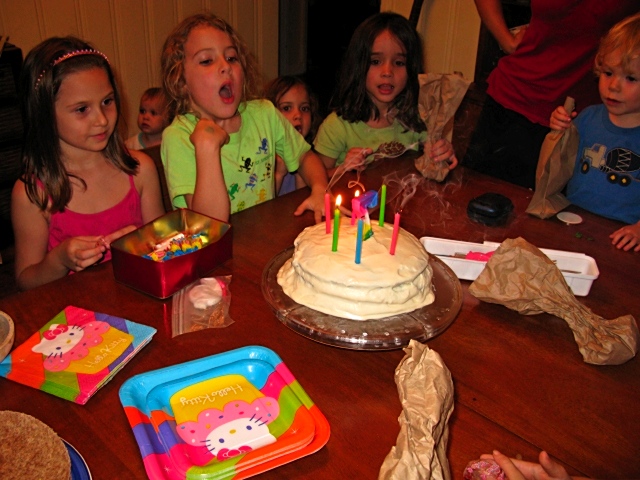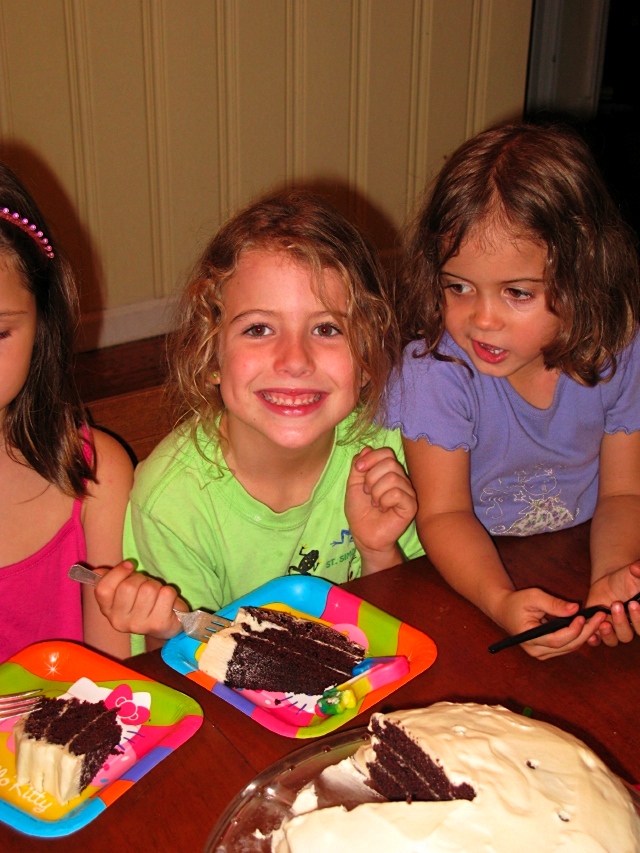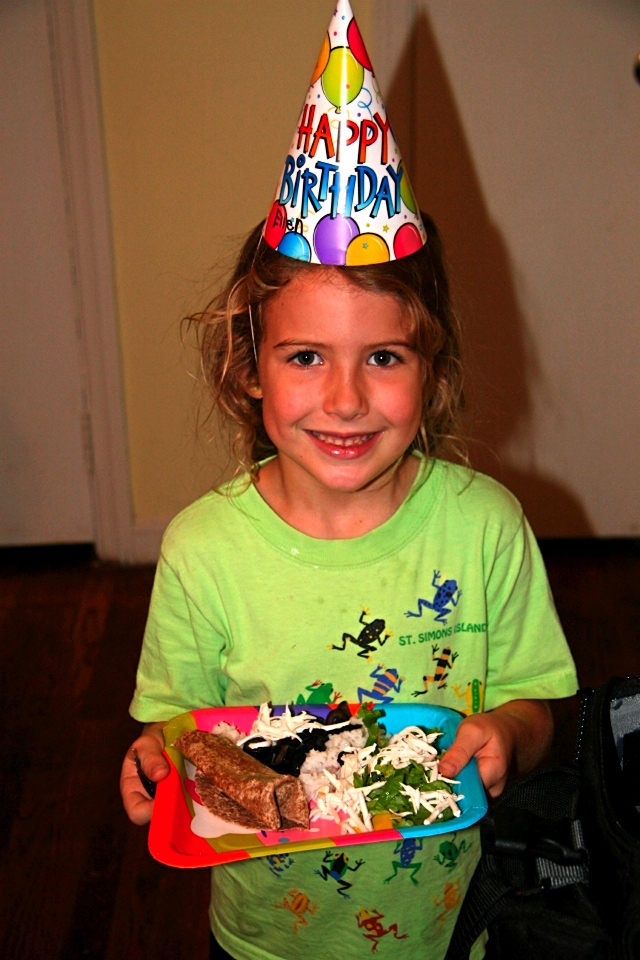FRUIT SMOOTHIE
This has been my daily lunch for the last month or more, at least on the days I work out around noon, which is most days. It's full of good stuff -- very healthful. I tweaked this recipe until I got it right, and it's delicious. The ultimate taste test -- the particular palate of one David K. -- produced two-thumbs up. He had one of these daily on his recent visit to Charlotte.
Here's what the finished product looks like -- recipe below:
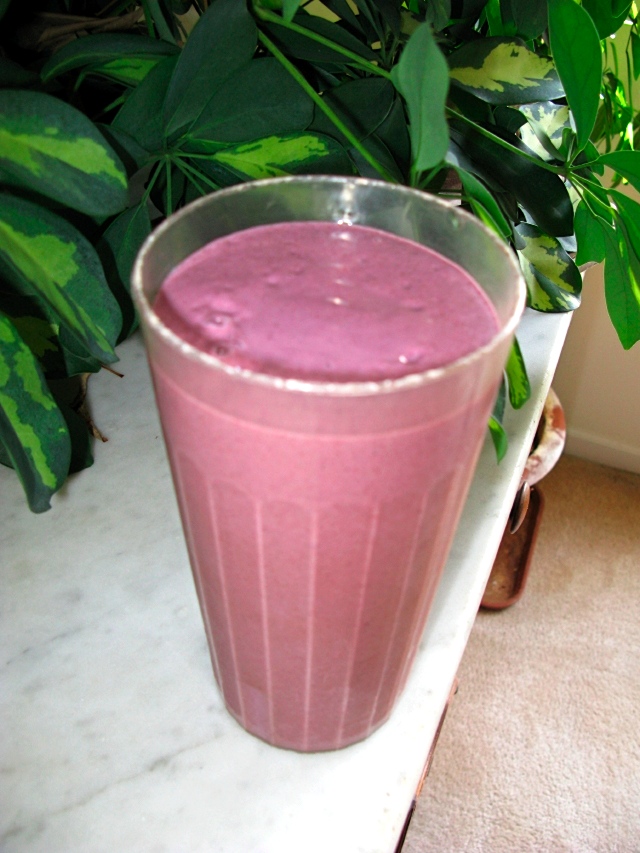
After pouring the smoothie into the tumbler I rinse the sides of the blender with (good) water, enough to wash the remaining mix down to the bottom of the blender container (whatever it's called). I then blend that mix and pour it into a separate glass and drink it down. It's diluted and weak, of course, but I'm not about to waste all the nutrition that's left on the sides of the blender. Rinsing and remixing is much easier than trying to scrape off what's left with a plastic spatula:
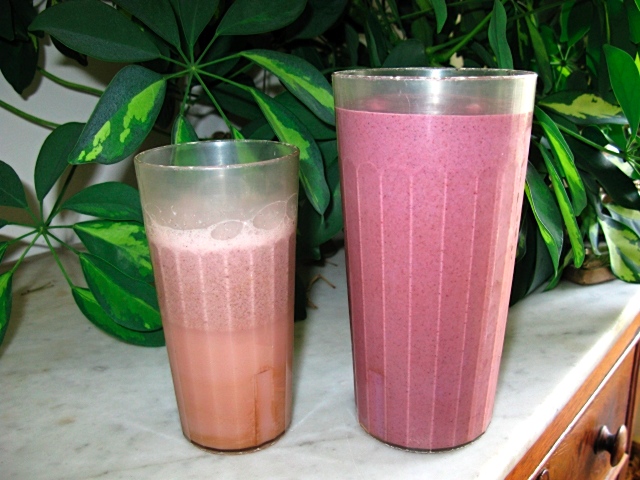
I'm going to list these incredients in the order I add them with a few notes. (A blender strong enough to blend ice and frozen bananas is required.) Into the blender "thing" put . . .
•A half-dozen ice cubes (made with good water)
•Half a peeled orange (leave as much of the white pith as possible)
•Half of a large, frozen banana (buy the cheap bags of ripe bananas when you can find them; peel, wrap in plastic wrap, and keep a supply in the freezer)
•1/3 cup organic blueberries (large bags of organic blueberries at Costco)
•1/3 organic berry mix (big bags of organic mixed berries from Costco -- contains blackberries, raspberries, blueberries)
•1/3 cut mango chunks (frozen from Trader Joe's, but not organic)
•2-3 organic strawberries
•6-8 organic red seedless grapes
•Other pieces of fruit? (I had some Turkish figs this week and threw one in for fun.)
•1/2 cup of decaf sun (green or black) tea
•1 Tbsp Vanilla extract (extract much better than vanilla flavoring; the best price I've found is at Trader Joe's for vanilla extract)
Put the lid on and start the blender, turning it up to the fastest speed. The ice and frozen banana create a frozen slush at first that doesn't "blend," so just let it run, creating heat to melt the frozen stuff a bit. I usually have to use the "plunger" that comes with the Vita-Mix to jam stuff down into the blades and get it mixing. You can add a bit more tea (or water) if you think it needs more liquid. Let it "blend" while you prepare the next ingredients.
I use a coffee bean grinder to grind up the following seeds into "meal" consistency before putting them in to blend:
•1 Tbsp. chia seeds (from www.getchia.com)
•1 Tbsp. raw pumpkin seeds
•1 Tbsp. raw sunflower seeds
•1 Tbsp. hemp seeds
•2 Tbsp. raw flax seeds (a daily supply of Omega 3's, along with the hemp and chia seeds)
Grind the above together into meal. When the "stuff" in the blender gets to a liquid consistency (creates a vortex in the blender container), dump the seed meal in and let it blend in.
Finally,
•1 heaping Tbsp. of vegan vanilla rice protein mix. (Available at most healthfood or natural markets, but only in one-pound sizes. I order the three-pound size from vitacost.com at a much better price. Vitacost.com has a fixed $4.95 shipping charge regardless of what you order. Any supplements, etc., that I buy I usually order from them.)
When a new vortex has formed and the seed meal is mixed in, put the protein powder in. Let the entire batch blend on "High" for another minute or or so. The longer it blends the smoother it gets, but depending on the speed of your blender the temperature will begin to rise as well -- so find the happy medium between smoothness and coldness.
Takes about 10 minutes to do the whole deal once you get in the routine, and well worth it. I have only made this with the Vita-Mix blender, which is a powerhouse and creates a velvety smooth blend. And the chia seeds add a "slippery" mucilage effect when they are added to anything (besides being full of good nutrition).
Next to come is the list of ingredients Jennifer used for burritos at Ellen's recent birthday party.
This has been my daily lunch for the last month or more, at least on the days I work out around noon, which is most days. It's full of good stuff -- very healthful. I tweaked this recipe until I got it right, and it's delicious. The ultimate taste test -- the particular palate of one David K. -- produced two-thumbs up. He had one of these daily on his recent visit to Charlotte.
Here's what the finished product looks like -- recipe below:

After pouring the smoothie into the tumbler I rinse the sides of the blender with (good) water, enough to wash the remaining mix down to the bottom of the blender container (whatever it's called). I then blend that mix and pour it into a separate glass and drink it down. It's diluted and weak, of course, but I'm not about to waste all the nutrition that's left on the sides of the blender. Rinsing and remixing is much easier than trying to scrape off what's left with a plastic spatula:

I'm going to list these incredients in the order I add them with a few notes. (A blender strong enough to blend ice and frozen bananas is required.) Into the blender "thing" put . . .
•A half-dozen ice cubes (made with good water)
•Half a peeled orange (leave as much of the white pith as possible)
•Half of a large, frozen banana (buy the cheap bags of ripe bananas when you can find them; peel, wrap in plastic wrap, and keep a supply in the freezer)
•1/3 cup organic blueberries (large bags of organic blueberries at Costco)
•1/3 organic berry mix (big bags of organic mixed berries from Costco -- contains blackberries, raspberries, blueberries)
•1/3 cut mango chunks (frozen from Trader Joe's, but not organic)
•2-3 organic strawberries
•6-8 organic red seedless grapes
•Other pieces of fruit? (I had some Turkish figs this week and threw one in for fun.)
•1/2 cup of decaf sun (green or black) tea
•1 Tbsp Vanilla extract (extract much better than vanilla flavoring; the best price I've found is at Trader Joe's for vanilla extract)
Put the lid on and start the blender, turning it up to the fastest speed. The ice and frozen banana create a frozen slush at first that doesn't "blend," so just let it run, creating heat to melt the frozen stuff a bit. I usually have to use the "plunger" that comes with the Vita-Mix to jam stuff down into the blades and get it mixing. You can add a bit more tea (or water) if you think it needs more liquid. Let it "blend" while you prepare the next ingredients.
I use a coffee bean grinder to grind up the following seeds into "meal" consistency before putting them in to blend:
•1 Tbsp. chia seeds (from www.getchia.com)
•1 Tbsp. raw pumpkin seeds
•1 Tbsp. raw sunflower seeds
•1 Tbsp. hemp seeds
•2 Tbsp. raw flax seeds (a daily supply of Omega 3's, along with the hemp and chia seeds)
Grind the above together into meal. When the "stuff" in the blender gets to a liquid consistency (creates a vortex in the blender container), dump the seed meal in and let it blend in.
Finally,
•1 heaping Tbsp. of vegan vanilla rice protein mix. (Available at most healthfood or natural markets, but only in one-pound sizes. I order the three-pound size from vitacost.com at a much better price. Vitacost.com has a fixed $4.95 shipping charge regardless of what you order. Any supplements, etc., that I buy I usually order from them.)
When a new vortex has formed and the seed meal is mixed in, put the protein powder in. Let the entire batch blend on "High" for another minute or or so. The longer it blends the smoother it gets, but depending on the speed of your blender the temperature will begin to rise as well -- so find the happy medium between smoothness and coldness.
Takes about 10 minutes to do the whole deal once you get in the routine, and well worth it. I have only made this with the Vita-Mix blender, which is a powerhouse and creates a velvety smooth blend. And the chia seeds add a "slippery" mucilage effect when they are added to anything (besides being full of good nutrition).
Next to come is the list of ingredients Jennifer used for burritos at Ellen's recent birthday party.

